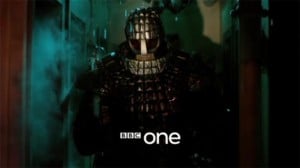It was interesting to see Doctor Who revisit the 80s situation of the Cold War, and interpose an alien into the midst of that setting, in tonight’s episode “Cold War.” The classic “base under siege” type of story is, in the case of “Cold War,” mirrored in a story of a submarine under siege. During the era of the Cold War, Doctor Who told a number of stories that envisaged two sides that wanted the planet and could not share it – whether the Ice Warriors from Mary, or the Silurians and Sea Devils coming out from their slumber. Particularly in the case of the latter, the stories consistently ended with the latter losing, and with the Doctor dismayed that a better solution had not been found. In tonight’s episode, looking back at the Cold War now that it is over, a different possibility presented itself. Spoilers ahead!
 “Cold War” witnesses the return of the Ice Warriors, the one-time rulers of Mars and a staple of the show in the era of Patrick Troughton and Jon Pertwee. The story explores something that seems to have been part of the mythos of the Ice Warriors from the very beginning, but which the special effects of the 60s and 70s did not facilitate depicting on screen, namely that the Ice Warriors are cyborgs integrated with armor, but capable of leaving that armor behind in a desperate situation.
“Cold War” witnesses the return of the Ice Warriors, the one-time rulers of Mars and a staple of the show in the era of Patrick Troughton and Jon Pertwee. The story explores something that seems to have been part of the mythos of the Ice Warriors from the very beginning, but which the special effects of the 60s and 70s did not facilitate depicting on screen, namely that the Ice Warriors are cyborgs integrated with armor, but capable of leaving that armor behind in a desperate situation.
As so often in science fiction set during the Cold War, a human-looking alien time traveler and his companion are assumed to be enemy spies. And as one would expect, the threat of a more alien sort of alien leads to their making common cause.
There is probably nothing to be gained from recounting many of the details. Some of them offer important symbolism and should be mentioned. Ordinary soldiers are often trained to be zealots, but commanders often have to have greater wisdom, and educated civilians may be perfectly able to appreciate the culture of their nation’s enemies (illustrated by the amusing references to Duran Duran and Ultravox). Failure to understand another’s culture, and failing to recognize another as a person and warrior rather than a monster, can lead to basic efforts to understand the other’s culture being ignored, setting a course down a path towards mutually-assured destruction.
 But there is hope inasmuch as persons share a capacity not merely to desire vengeance and be angry, but also show mercy – and perhaps too to recognize in the hostility of others something to be treated more with condescension rather than the reciprocation of hostility one might offer to an equal.
But there is hope inasmuch as persons share a capacity not merely to desire vengeance and be angry, but also show mercy – and perhaps too to recognize in the hostility of others something to be treated more with condescension rather than the reciprocation of hostility one might offer to an equal.
There was no religious reference that I noticed. That is to be expected, especially on a Soviet military submarine. But the emphasis on recognizing the other not as savage but highly intelligent, and on our ability to trust and show mercy even in the midst of hostility, both intersects with religious concerns, but also illustrates that those concerns are not the exclusive purview of religion, but find expression in religion because they stem from universal human instincts and capacities. And perhaps, universal ones. But if universal, then they do indeed point beyond themselves to the question of why the universe is such as it is, to give rise to sentient beings with these emotional and moral capacities.
I will say that Clara’s performance seemed somewhat awkward – and the character seemed aware that she wasn’t entirely sure how to behave, even asking or reflecting out loud on her own performance. By the end, she seemed on board with saving the world as “what we do.” But there was still a sort of awkwardness, as though she was simultaneously a bit too comfortable already in the role of companion of the Doctor, and yet at times expressing hesitation and uncertainty almost for show in an attempt to make up for that.
This season, Matt Smith’s depiction of the Doctor has seemed to me less like Patrick Troughton’s newly-rejuvenated comical Doctor, and more like an old man in a young man’s body.
What did you make of “Cold War”?












